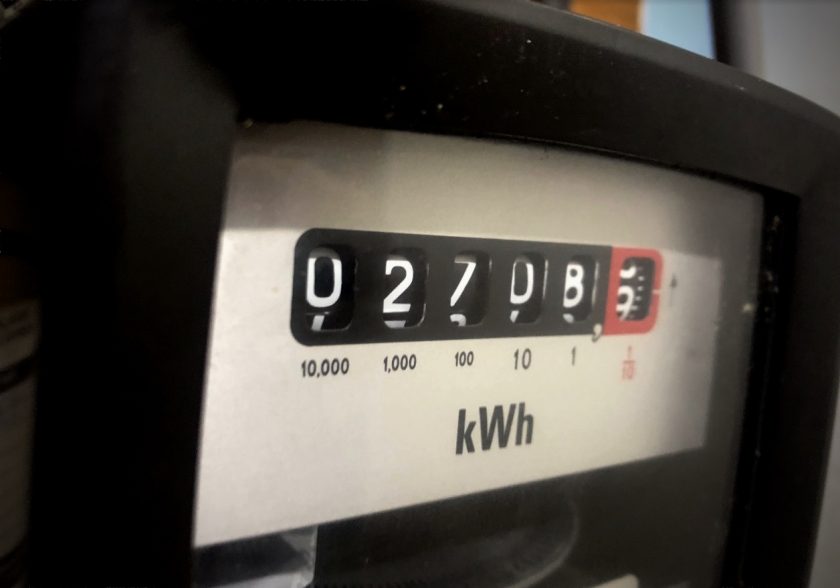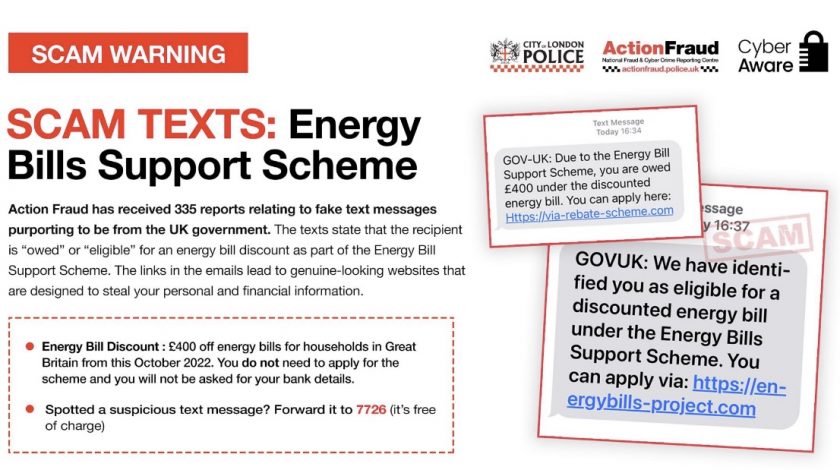Number of scam texts targeting £400 energy bill support on the increase

Flintshire residents are being warned to watch out for fake text messages claiming to be from the Government, inviting people to apply for the £400 energy bill support.
It’s a scam – the £400 will be paid automatically. People do not need to apply.
The scam text tells the receiver that they are eligible to apply for a discounted energy bill as part of the Energy Bills Support Scheme.
But this is a scam, and should be ignored and/or reported.

From 1 October, a limit on the price households pay for a unit of gas and electricity they use will mean a typical energy bill should be £2,500 a year.
The first instalment of a £400 discount for households will also appear on bills.
Action Fraud said today that it had already received 335 reports about scam text messages relating to the scheme, saying:
🚨SCAM WARNING – please share🚨
We’ve received 335 reports about scam text messages relating to the Energy Bills Support Scheme.
✅You DO NOT need to apply for the scheme, or provide any bank details.
✅Forward suspicious texts to 7726 (it’s free). #CyberProtect pic.twitter.com/3GheYjOJ3u
— Action Fraud (@actionfrauduk) October 12, 2022
Ben Gallizzi, energy expert at Uswitch.com, offers advice on how to spot an energy scam text:
“There are many fraudulent emails and texts circulating at the moment, aimed to trick people into believing they’re being offered extra help with their energy bills.
“Known as ‘phishing’ scams, these have been created by fraudsters who are posing as organisations such as Ofgem or the UK Government.
“The £400 energy bill support scheme, available to all households, is given automatically by your providers, and you will not need to offer any personal information to receive it.”
Uswitch tips on how to spot and handle a scam text:
- Spell check. Does the message contain spelling mistakes? If so, it is most likely a scam. Professional organisations will almost never make spelling or grammatical errors.
- Surprise text. Were you expecting the text message? If not, this could be a sign that the fraudsters are trying to catch you off guard.
- Repeat caller. Have you received a genuine text from this organisation before? If so, check to see whether they’re from the same sender. You can also find the organisation’s contact details via their official website, or give their customer service team a call to check the text for you.
- Dodgy links. Does the text include suspicious links? Never click on links within a text you’re not sure about. Again check via the organisation’s customer service team, as clicking a scammer’s link could result in your personal details being taken, or even your money.
- Ignorance is bliss. Do not reply to a suspicious text – even if you want to catch them out. Replying will alert them that your number is in use and active, leaving you open to future scam attempts.
- Block, report, delete. If you’re concerned about a scam text, block the sender and take a screenshot of the text for evidence. You should report the text to Action Fraud on 0300 123 2040 or on their website, then delete the message.
What are some common energy scams?
Ofgem energy scams
A scammer may contact you claiming to be from the energy regulator Ofgem. They may ask you to change your bank details or provide personal information to receive funding or cheap energy.
Ofgem will never ask you for personal information and you don’t need to do anything to receive £400 off your energy bills this winter. Ofgem will also never sell you energy or show up at your house.
Which? also warned earlier this month about bogus emails using the Ofgem logo and branding sent to consumers claiming to offer an ‘energy bill rebate scheme’. More here.
Energy rebate scams
Recently, scammers have been using the £400 government energy bill rebate scheme to trick people into handing over their details. Other tactics have included promises of sums of money to people of pension age or with disabilities. For more information on the energy bill rebate scheme, see this blog on how to get £400 off your energy bills from October.
Energy efficiency and home improvement scams
Another way a scammer might try to trick you is by telling you that your home is unsafe, and changes must be made immediately to prevent harm to you and your household. This can be extremely worrying, and it’s always best to put your mind at rest by calling Citizens Advice or checking with a qualified and accredited professional.
For more information, see this blog from Citizens Advice on common energy efficiency scams.
Spotted something? Got a story? Email: [email protected]
Latest News
